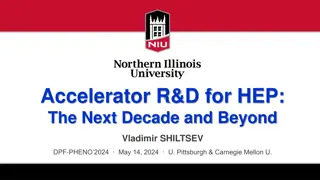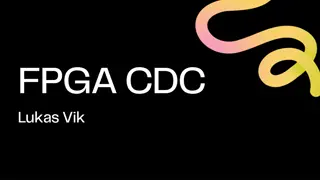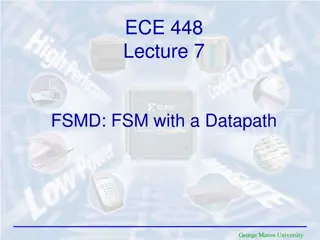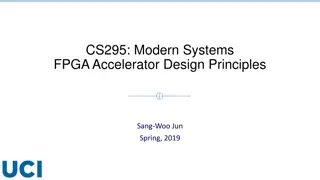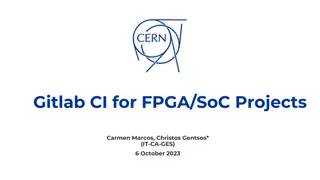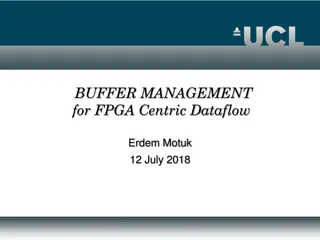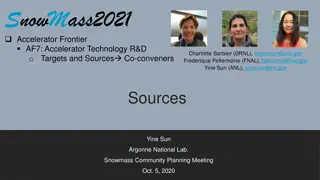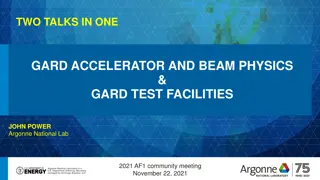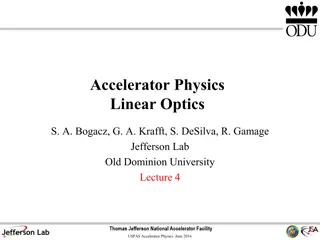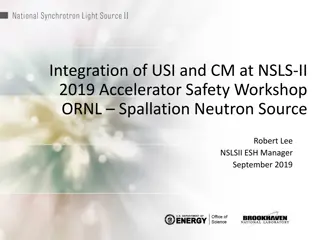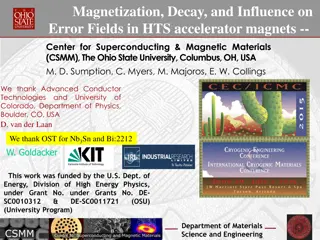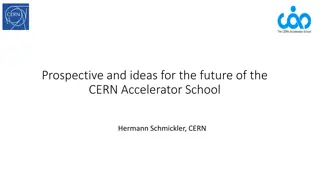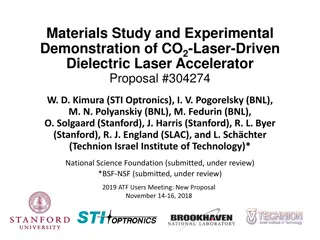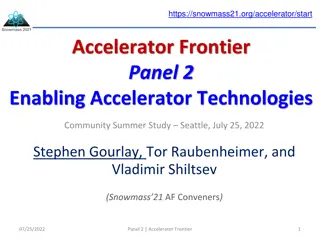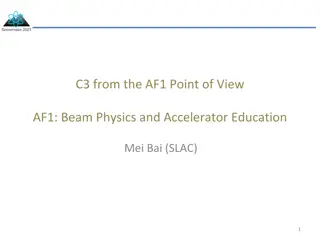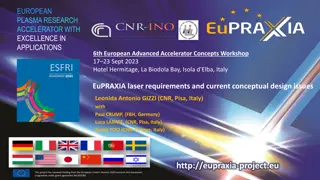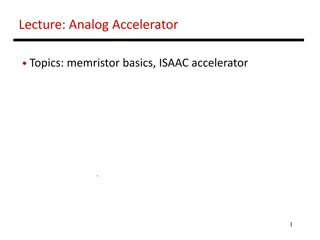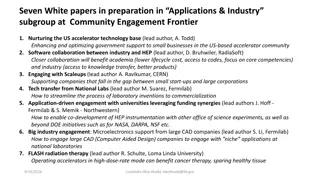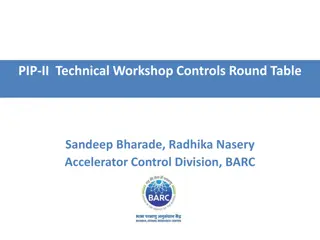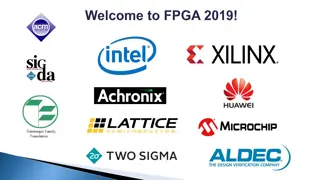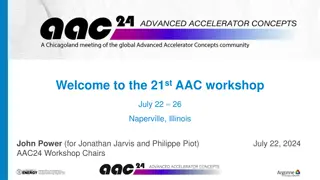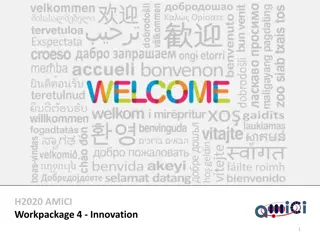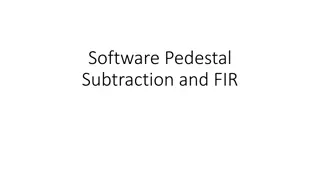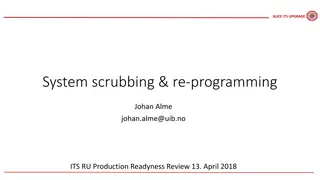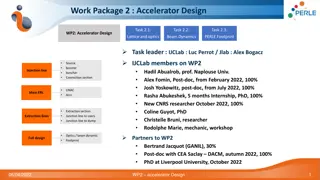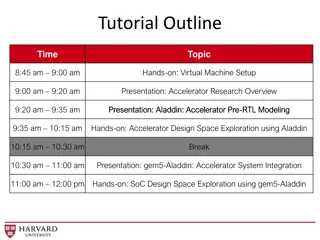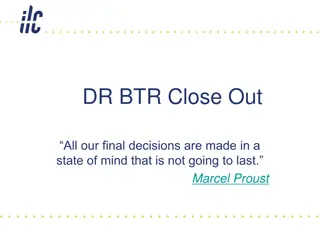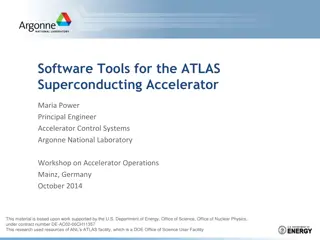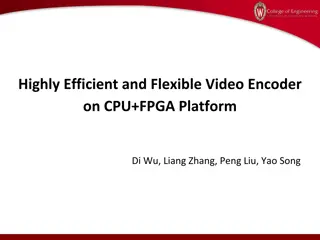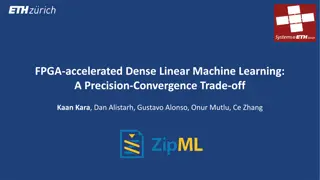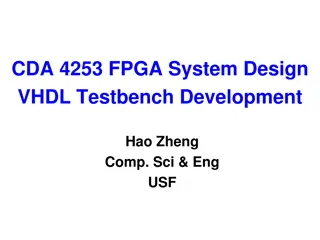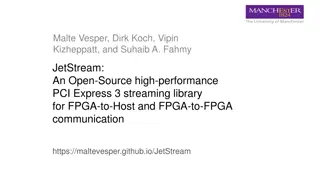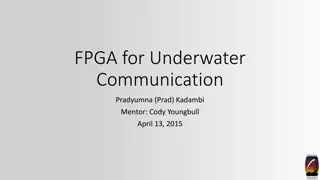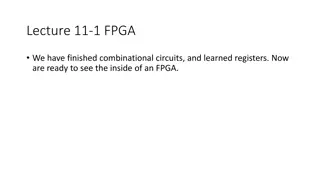Current Trends in High Energy Accelerator Developments
Explore the latest trends in high energy accelerator development as discussed by experts from various institutes around the world, including proposals from China and existing accelerator projects. Learn about the classification of accelerator facilities based on size and the ongoing evolution of fut
0 views • 36 slides
European Particle Physics Strategy Update & Accelerator R&D Overview
European Particle Physics Strategy updates serve as the cornerstone for long-term decision-making in the field, with a focus on Accelerator R&D for High Energy Physics. The update process involves key questions, R&D strategies for RF technologies, and implementation plans. Approved strategies emphas
7 views • 25 slides
Accelerator R&D for High-Energy Physics: Advancements and Future Prospects
Vladimir Shiltsev's presentation at DPF-PHENO 2024 discusses the evolution of accelerator R&D in high-energy physics, emphasizing the need for off-shore Higgs factories and targeted collider developments. The P5 recommendations underscore the importance of engaging in feasibility studies for advance
0 views • 28 slides
Advanced FPGA Design: Ensuring Safety, Reliability, and Predictability
With a background in MSc Applied Physics and 10 years of experience in FPGA development, the focus is on verifying asynchronous and analog aspects of FPGA design for safe, reliable, and robust performance. Limited resources and articles drive the need to collaborate for knowledge sharing and explori
0 views • 18 slides
Understanding FSMD: FSM with Datapath in FPGA Design
Explore the concept of Finite State Machine with Datapath (FSMD) in FPGA design, as discussed in the lecture at George Mason University. Learn about translating sequential algorithms into hardware, using registers and control paths to simulate variables, and realizing systems through RTL design. Dis
3 views • 54 slides
FPGA Accelerator Design Principles and Performance Snapshot
This content explores the principles behind FPGA accelerator design, highlighting the extreme pipelining via systolic arrays that enables FPGAs to achieve high speeds despite lower clock frequencies compared to CPUs and GPUs. It delves into the application of Flynn's Taxonomy, performance snapshots
0 views • 17 slides
Enhancing FPGA/SoC Projects with Gitlab CI: A Comprehensive Overview
Exploring the significance of Continuous Integration (CI) in FPGA/SoC projects, this presentation delves into the basics of Gitlab CI, defining CI jobs, the benefits of CI practices, project objectives, and the future plans for supporting over 100 users. The focus is on creating a scalable, VM-based
0 views • 13 slides
FPGA Centric Dataflow Buffer Management Overview
This overview discusses buffer management for FPGA-centric dataflow systems, including the use of DDR4 RAM, solid-state storage, FIFO structures, and trigger commands for efficient data processing and storage. It also covers the handling of compressed and uncompressed data volumes, proposed hardware
0 views • 12 slides
Government Contractors Basics for Beginners with OK APEX Accelerator
Explore the essentials of government contracting for beginners, including details about OK APEX Accelerator (formerly PTAC), the services offered, NAICS codes, SAM registration, and more. Learn how APEX Accelerator assists businesses in participating in government contracts, offering counseling, ass
0 views • 20 slides
Accelerator Technology R&D Targets and Sources Overview
The SnowMass2021 Accelerator Frontier AF7 focuses on Accelerator Technology R&D, exploring targets and sources such as high brightness electron sources, muon sources, and high intensity ion sources. The community planning meeting discussed various Letter of Interest submissions outlining innovative
0 views • 7 slides
Accelerator Science and Beam Physics Research Overview at US National Laboratories
US high-energy physics faces budget challenges despite the need for support to remain competitive. John Power from Argonne National Laboratory discusses the importance of funding for core research and accelerator science. The GARD program in the Department of Energy Office of High Energy Physics pro
0 views • 25 slides
Linear Beam Optics and Particle Motion in Accelerator Physics
Explore the fundamental concepts of linear beam optics and particle motion in accelerator physics, covering topics such as design trajectory, path length, phase advance, transfer matrix, and more. Understand the intricacies of designing accelerators and the mathematical representations involved in o
0 views • 78 slides
Safety Assessment and Accelerator Safety Envelope Review
Overview of the Safety Assessment Document (SAD) and Accelerator Safety Envelope (ASE) process for the 400 MeV Test Area (MTA) at Fermilab. The document details the shielding assessment, approval process by various committees, and updates made to the SAD chapters and the Accelerator Safety Envelope.
4 views • 8 slides
Integration of USI and CM at NSLS-II 2019 Accelerator Safety Workshop
This document outlines the Integration of Unreviewed Safety Issues (USI) and Configuration Management (CM) at the NSLS-II 2019 Accelerator Safety Workshop conducted at the ORNL Spallation Neutron Source. It covers the USI process, screening evaluations, training, and qualifications necessary for the
0 views • 13 slides
Magnetization, Decay, and Error Fields in HTS Accelerator Magnets
The research conducted at The Ohio State University focuses on understanding the magnetization, decay, and influence of error fields in high-temperature superconducting (HTS) accelerator magnets. The study explores the impact of different superconducting materials such as Nb3Sn, YBCO, and Bi:2212 on
0 views • 21 slides
Future Prospects and Evolving Ideas for the CERN Accelerator School
The CERN Accelerator School is planning upcoming schools and venues, with proposals for its evolution presented. Courses cover various topics across Member States, with a focus on advanced accelerator physics. A future HEP Collider School is also in the pipeline. Suggestions for improvement include
0 views • 16 slides
CO2-Laser-Driven Dielectric Laser Accelerator Proposal
Study and experimental demonstration of a CO2-laser-driven dielectric laser accelerator, addressing the limitations of current accelerator technologies by utilizing longer laser wavelengths for increased charge and improved beam control. The proposal aims to develop a novel in-vacuo scheme for ultra
0 views • 13 slides
Future of Accelerator Technologies: Enhancing Colliders and R&D Programs
The Accelerator Frontier Panel discusses the crucial components to enable future accelerators, emphasizing the need for a National Future Collider R&D Program, General Accelerator R&D, and adequate accelerator and test facilities. The message stresses the importance of an integrated future collider
0 views • 17 slides
Recommendations for Advancing Beam Physics and Accelerator Education
The exploration of new physics demands future accelerators beyond 1 TeV lepton colliders and 100 TeV hadron colliders, requiring luminosity in a specific range. Various challenges, including reaching quantum limits, face conventional RF-based beams. The pursuit of disruptive acceleration technologie
0 views • 7 slides
European Plasma Research Accelerator with Excellence in Applications
The European Plasma Research Accelerator project, also known as EuPRAXIA, is a cutting-edge initiative that aims to develop a laser driver for advanced accelerator concepts. Led by a team of experts from various European countries, the project focuses on laser requirements, overall layout, thermal m
0 views • 33 slides
Analog Accelerator: Memristor Basics and ISAAC Accelerator
Explore the world of analog acceleration with topics covering memristor basics and the ISAAC accelerator. From understanding noisy analog phenomena to leveraging wires as ALUs, delve into crossbars for vector-matrix multiplication and the challenges of high ADC/DAC area/energy. Discover solutions li
0 views • 23 slides
Engaging Innovation in Accelerator Technology and Industry Partnerships
This collection of seven white papers explores a variety of topics in the fields of accelerator technology and industry collaborations. Topics range from nurturing the US accelerator technology base to enhancing government support for small businesses in the accelerator community. The papers also de
0 views • 6 slides
Advanced Controls and Systems Development in Accelerator Technology
Explore the cutting-edge technologies and extensive experience in system development within the Accelerator Control Division at BARC. The workshop covers a range of topics including SoC-FPGA system architecture, GUI development for RF control, EPICS application development, and lessons learned in im
0 views • 15 slides
Exploring the Latest Trends in FPGA Technology and Applications
The ACM International Symposium on FPGAs brought together industry leaders and academia to discuss the rapid growth of FPGA technology in fields like machine learning, circuit design, and computing architectures. With insightful sessions, keynotes, and panels, the symposium highlighted the increased
0 views • 13 slides
Advanced Accelerator Concepts Workshop Highlights and Vision
The 21st AAC workshop held in Naperville, Illinois, showcased research on advanced accelerator physics and engineering. Key themes included developing cost-effective facilities for high-energy physics and photon science, as well as compact facilities for industrial, medical, and security application
0 views • 10 slides
Advancing European Innovation in Accelerator and Magnet Technologies
The AMICI H2020 project aims to enhance collaboration between European companies to drive innovation in mature Accelerator and Magnet technologies. Through round table discussions, the project seeks to identify opportunities for industry engagement, establish collaborative frameworks, and optimize t
0 views • 17 slides
Pedestal Subtraction and FIR Technique Implementation in FPGA
The content discusses the implementation of the Pedestal Subtraction and Finite Impulse Response (FIR) techniques in FPGA for processing ADC counts from a single channel. It details the update rules for pedestal values during hit detection, considerations for FIR tap values, and the process of new A
0 views • 5 slides
FPGA Data Ingest Processing for NARA Electronic Records
NARA's Innovative Systems Lab at the University of Illinois is exploring FPGA technology for electronic records management. The project aims to address challenges in data storage, retrieval, and integrity for long-term archival. FPGAs offer software-configurable chips with unique capabilities for on
0 views • 76 slides
Workshop on Maintaining PIP-II within the Accelerator Complex - Operational Requirements and Interfaces
This workshop, held on July 15, 2021, focuses on maintaining the PIP-II within the Accelerator Complex through discussions on uptime, availability, maintainability, and operability requirements. The event covers various presentations on system interfaces, maintenance strategies, and operational expe
0 views • 4 slides
Overview of ALICE ITS UPGRADE System Scrubbing and FPGA Programming
ALICE ITS UPGRADE system undergoes scrubbing for error correction using various techniques like Xilinx Soft Error Mitigation Core and External Scrubbing Network. The FPGA programming overview includes standard operations, remote updating methods, and FPGA versions timeline. Relevant topics cover dat
0 views • 19 slides
Accelerator Design and DC Photogun Project Overview
This project overview outlines the tasks and goals related to Accelerator Design and DC Photogun within Work Packages 2 and 3. It includes details on team members, task leaders, activities, equipment, international collaborators, and identified contributors. Key focus areas encompass accelerator des
0 views • 13 slides
Accelerator Design Space Exploration Tutorial
This tutorial covers hands-on activities and presentations on virtual machine setup, accelerator research overview, RTL modeling, design space exploration using Aladdin, gem5-Aladdin for system integration, and SoC design space exploration. Aladdin, a pre-RTL power-performance accelerator simulator,
0 views • 52 slides
Advanced Particle Accelerator Project Updates
Explore the latest updates on the advanced particle accelerator project, including decisions on operating scenarios, lattice parameters, RF considerations, and construction criteria for the accelerator facility. Cost adjustments, upgrade plans, and timelines for key components are discussed, emphasi
0 views • 9 slides
Control System Overview for ATLAS Superconducting Accelerator
The ATLAS Control System Group manages control systems from ion sources to specified areas, utilizing hardware such as AlphaServer and various controllers. Software tools from Vista Control Systems offer real-time control functionalities for OpenVMS, Linux, and Windows. Data management includes CAMA
0 views • 17 slides
Efficient Video Encoder on CPU+FPGA Platform
Explore the integration of CPU and FPGA for a highly efficient and flexible video encoder. Learn about the motivation, industry trends, discussions, Xilinx Zynq architecture, design process, H.264 baseline profile, and more to achieve high throughput, low power consumption, and easy upgrading.
0 views • 27 slides
Efficient Training of Dense Linear Models on FPGA with Low-Precision Data
Training dense linear models on FPGA with low-precision data offers increased hardware efficiency while maintaining statistical efficiency. This approach leverages stochastic rounding and multivariate trade-offs to optimize performance in machine learning tasks, particularly using Stochastic Gradien
0 views • 26 slides
Testbench Development in FPGA System Design Using VHDL: An Overview
Testbenches play a crucial role in FPGA system design using VHDL by allowing for systematic testing of digital circuits. They facilitate the application of stimuli to the Design Under Test (DUT) and verification of expected outputs. This overview covers the basic processes involved in testbench deve
0 views • 40 slides
Overview of JetStream: A High-Performance PCIe Streaming Library for FPGA Communication
JetStream is an open-source PCIe streaming library developed for efficient FPGA-to-Host and FPGA-to-FPGA communication. It implements key OSI layers, handles physical and data link layers, and provides mechanisms for chunk transfers and managing outstanding requests. JetStream offers superior perfor
0 views • 23 slides
FPGA for Underwater Communication Project Overview
This project, led by Pradyumna (Prad) Kadambi with mentor Cody Youngbull, aims to develop a robust high-speed underwater communication system using Field Programmable Gate Arrays (FPGA). The project addresses the slow and cumbersome nature of current underwater communication methods, with a focus on
0 views • 9 slides
Understanding the Inner Workings of FPGA and Complex Programming Logic Devices
Delve into the inner mechanisms of Field Programmable Gate Arrays (FPGA) and Complex Programming Logic Devices, examining components such as configurable logic blocks, lookup tables, function generators, multiplexers, and flip-flops. Explore the application of Shannon's Expansion Theorem in circuit
0 views • 10 slides


